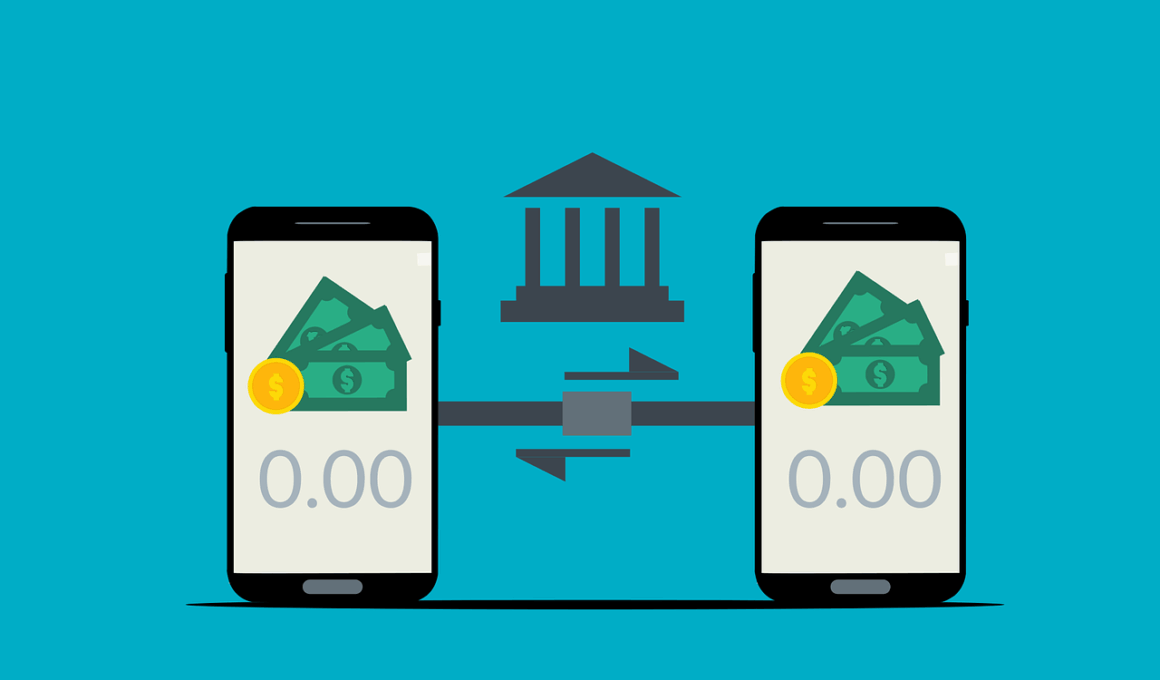The Future of Peer-to-Peer Payments in Digital Wallets
The rapid evolution of digital wallets in recent years has significantly transformed the landscape of peer-to-peer (P2P) payments. Today, consumers favor digital payments over traditional methods, as they offer unparalleled convenience and speed. The technology behind digital wallets enables users to transfer money instantly, eliminating the need for cash or physical checks. Numerous platforms, including PayPal, Venmo, and Cash App, allow individuals to send or receive money with just a few taps on their smartphones. Moreover, financial institutions are increasingly integrating P2P payment solutions within their banking applications, enhancing user experiences. With the global rise in smartphone penetration, more people are embracing digital wallets as their primary mode for managing financial transactions. Digital wallets also come with advanced security features, such as biometric authentication, which increases user trust. However, companies must remain vigilant about cybersecurity threats that could jeopardize sensitive financial information. As competition intensifies, keeping customer trust and satisfaction high will become vital for success in this growing segment. Exciting developments in technology, cybersecurity, and user experience promise to shape the future of P2P payments in digital wallets significantly.
As technology continues to advance, the future of peer-to-peer payments is poised to change dramatically. One of the most crucial trends driving this transformation is the increasing adoption of cryptocurrency within digital wallets. Bitcoin, Ethereum, and other cryptocurrencies are becoming more mainstream and acceptable for transactions. This adoption allows users to transfer money across borders efficiently, overcoming traditional financial barriers. Furthermore, integrating blockchain technology in digital wallets ensures transaction security and transparency. Smart contracts can facilitate automated transactions, streamlining processes and reducing costs. Users can expect to enjoy lower fees when utilizing cryptocurrencies for P2P payments compared to traditional methods. Additionally, the volatility of cryptocurrencies remains a concern for many potential users, but innovative solutions are being developed to help stabilize their value. As cryptocurrencies grow in popularity, digital wallets will likely evolve to accommodate these new payment methods. Companies that adapt their platforms to include and promote cryptocurrency features will attract a more extensive customer base eager to explore digital payment possibilities. Therefore, transitioning into digital currency integration is crucial for sustaining relevance in the competitive P2P payment marketplace.
Emerging Technologies in Digital Wallets
Emerging technologies are also anticipated to play a pivotal role in shaping the future of P2P payments through digital wallets. The integration of artificial intelligence (AI) and machine learning will enhance user experience by enabling personalized financial solutions. AI algorithms can analyze user behavior and preferences, suggesting tailored financial products and services. Such advancements will create a more engaging user experience while increasing overall transaction efficiency. Voice recognition technology is another area experiencing growth, allowing users to make transactions using voice commands. This futuristic feature could revolutionize payment transactions and simplify processes for all demographics. Moreover, augmented reality (AR) could allow users to visualize their wallets through interactive experiences, merging the digital and physical realms seamlessly. Companies investing in such innovative technologies position themselves to gain significant market advantages. Partnering with technology providers will ensure their digital wallets remain competitive and forward-thinking. Continuous investment in research and development is essential for staying ahead in the rapidly changing fintech environment. The willingness to embrace change will determine which companies thrive in the evolving landscape of digital payments.
Consumer behavior is another significant factor influencing the future of digital wallets and P2P payments. As younger generations grow accustomed to digital-native solutions, they seek instant gratification in financial transactions. Consequently, transaction speeds are paramount, with consumers expecting instantaneous results. Peer-to-peer payments must be seamless, enabling users to send funds without delays or complexities. This expectation has resulted in fintech companies focusing on enhancing user interfaces and simplifying user interactions. Furthermore, the social aspect of peer-to-peer payments cannot be overlooked; users increasingly prefer platforms that facilitate not only transactions but also social engagement. Integration of social networking features within wallet applications is likely to attract more users. Collaboration with various merchants and services can enhance these social interactions while boosting transaction volume. Gamification and rewards for transactions could incentivize user engagement, encouraging frequent use of digital wallets. Companies that prioritize understanding consumer preferences and behaviors will be better positioned to optimize their platforms. Fostering user loyalty and satisfaction through tailored P2P payment experiences is essential in this competitive market.
Regulatory Challenges in Digital Payments
Despite the promising future of P2P payments via digital wallets, several regulatory challenges need to be addressed. Regulatory bodies worldwide are evolving to keep pace with digital innovations, but the fragmentation of regulations across jurisdictions can be problematic. Companies must navigate complex legal landscapes while ensuring compliance with varying requirements. A lack of standardized regulations can stifle innovation and make it difficult for businesses to scale globally. Additionally, consumer protection concerns and privacy issues are paramount in digital payment systems. Users must feel confident that their transactions are secure and their data protected. To alleviate concerns, fintech companies need to prioritize transparency in their operations. Businesses should not only comply with existing regulations but also proactively engage with regulators to influence future policies. Establishing clear guidelines surrounding payment services and consumer protections will help cultivate trust within the ecosystem. Emphasizing compliance in business strategies allows companies to develop robust frameworks for P2P payments, ensuring long-term success. By remaining informed about regulatory developments, businesses can stay ahead of the curve while building a trustworthy reputation.
The global pandemic accelerated the adoption of digital payments, transforming consumer habits dramatically. Many businesses pivoted to support contactless transactions as health concerns prompted consumers to avoid cash. This shift has introduced a broader audience to digital wallets and illustrated their advantages. With the rise of remote work, individuals are also utilizing P2P payment systems more frequently for transactions with friends, family, and service providers. E-commerce has also flourished, leading to increased reliance on digital payment options. Tapping into this shift, companies expanding their digital wallet offerings will benefit from enhanced customer engagement and retention. Furthermore, businesses can leverage this opportunity to educate users about their platforms, instilling confidence in digital wallets. Offering promotions or incentives can encourage users to adopt digital wallets, fueling future growth. As more individuals recognize the convenience and security of digital transactions, the market for P2P payments will likely expand. Understanding the long-term implications of the pandemic on payment habits is crucial for companies investing in digital wallets, ultimately guiding their strategies toward sustainable growth.
Conclusion and Future Insights
In conclusion, the future of peer-to-peer payments in digital wallets looks promising, driven by technology, consumer preferences, and innovation. Companies that effectively adapt to these evolving trends will lay the foundation for continued success in the financial sector. Emphasizing user experience while ensuring robust security measures will be crucial in building customer trust. The potential integration of cryptocurrencies and emerging technologies can set businesses apart in a competitive landscape. As digital wallets continue to penetrate new markets, the demand for seamless and social payment experiences will increase. Staying informed about regulatory developments will empower companies to navigate challenges and innovate responsibly. The fusion of finance with social interactions presents a unique opportunity to engage users and create diverse offerings. As users express preferences for immediacy in transactions, businesses should prioritize fast processing times and secure solutions. The outlook for digital payments is bright, and the evolution of P2P services will reshape financial ecosystems worldwide. Companies ready to seize these opportunities will forge significant advancements in the future of payments and influence the way people manage their finances.



